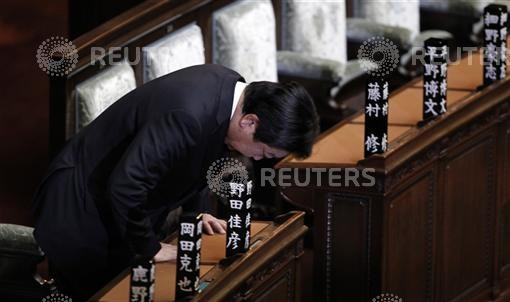Japan, Land of the Rising Debt and Age Problems

Japan is going through a period of very hard choices which the current Prime Minister of its coalition government Yoshihiko Noda, is pressing the Diet, Japan's Parliament, to address. On 30 March 2012, Prime Minister Noda submitted laws to double the present sales tax of five per cent, proposing a rise to eight per cent in April 2014 and then to 10 per cent in April 2015. His determination, if necessary, to stake his Government's survival on these laws being passed by the Diet was made plain when he told a news conference:
"I want to create a society where people think tomorrow will be better than today. Removing people's worries about (the) sustainability of the welfare system...is fundamental to that philosophy.
"Merely submitting the Bills is not enough. I will do my utmost for their enactment..."
In a country where harmony and consensus is sought even in politics, this is a bold move and more so when it's not certain he can carry all members of his own Party with him. The media in Japan definitely expect a political showdown and quite possibly an election in the not distant future. Mr Noda may well feel that as neither he nor his Government is too popular in the polls, if he is going to be defeated, it might as well be on a worthwhile principle of making a start in getting Japan's financial house in order. A daunting task though for time is not on Japan's side and her people are right to be concerned about the "sustainability of the welfare system"
There was also external pressure and Japan's standing in the world for Mr Noda to consider - the Yen is one of the Reserve Currencies - with the Ratings agencies being somewhat critical of Japanese politicians and the nation's debt level. On 20 February 2012, Standard & Poor warned Japan that there was a strong possibility of it being downgraded from its current AA-, "if medium term growth prospects weaken." S&P did however credit Japan with having an "ample net external asset position, relatively strong financial system, and diversified economy."
On 24 February, it was Moody's turn and this agency was rather more pointed, warning that a delay in doubling the Sales Tax Bill "would be a credit-negative event" whilst acknowledging the fact that Japan still has a healthy Current Account balance.
The big immediate problem is the National Debt which topped $11 trillion in March 2011, about $90,000 for every citizen and a rise of over $500 billion from the previous year. The Finance Ministry expected this figure to rise to $12 trillion in March 2012 but this was before the full extent of the Tohoku Earthquake and Tsunami and Fukushima Reactor accident was known. At the end of October 2011 as a Third Supplementary Budget was being submitted to the Diet due to these disasters, NHK News (Japan Broadcasting Corporation) announced that the National Debt would likely reach $13.5 trillion by 31 March 2012.
Even without the Tohoku misfortune, Japan's deficits over the past four years have been largely due to the Government issuing bonds to cover the country's increasing welfare demands. Now, just servicing the Debt will consume about 50 per cent of Government revenue - so just as well that most of the National Debt is internalized.
Looking ahead a little longer, there is a very real problem for all Japanese politicians to concentrate their minds on. The country's debt is simply unsustainable as Japan's population is not just ageing but now falling. The population peaked in 2010 at just over 128 million and as of March 2012 is thought to be 127,650,000. It is also rapidly ageing as more and more people live longer, couples marry later - if at all - and have only one or two children. Cone 2060, Japan's population is expected to be between 87 million and 95 million, 40 per cent of which will be over 65. That must concentrate minds!
© Copyright IBTimes 2025. All rights reserved.






















